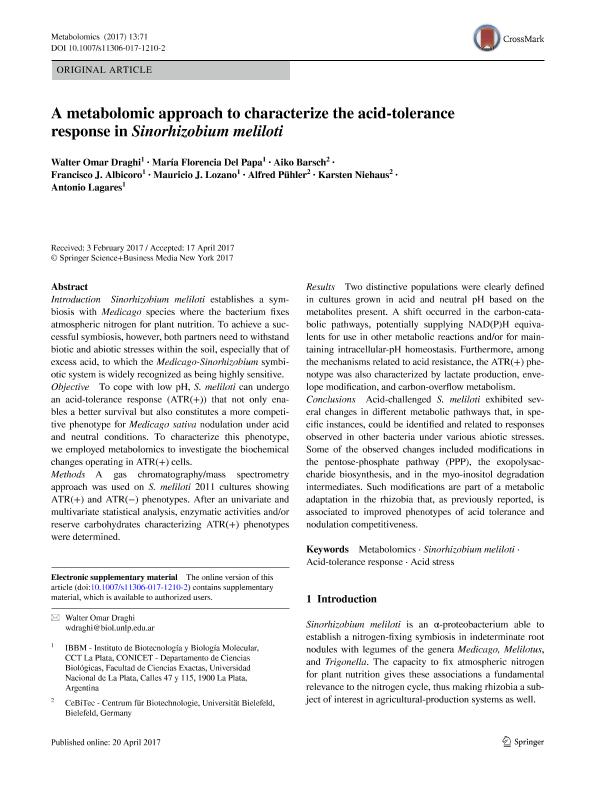Mostrar el registro sencillo del ítem
dc.contributor.author
Draghi, Walter Omar

dc.contributor.author
del Papa, Maria Florencia

dc.contributor.author
Barsch, Aiko
dc.contributor.author
Albicoro, Francisco Javier

dc.contributor.author
Lozano, Mauricio Javier

dc.contributor.author
Pühler, Alfred
dc.contributor.author
Niehaus, Karsten
dc.contributor.author
Lagares, Antonio

dc.date.available
2018-06-08T20:49:57Z
dc.date.issued
2017-06
dc.identifier.citation
Draghi, Walter Omar; del Papa, Maria Florencia; Barsch, Aiko; Albicoro, Francisco Javier; Lozano, Mauricio Javier; et al.; A metabolomic approach to characterize the acid-tolerance response in Sinorhizobium meliloti; Springer; Metabolomics; 13; 6; 6-2017
dc.identifier.issn
1573-3882
dc.identifier.uri
http://hdl.handle.net/11336/48011
dc.description.abstract
Introduction: Sinorhizobium meliloti establishes a symbiosis with Medicago species where the bacterium fixes atmospheric nitrogen for plant nutrition. To achieve a successful symbiosis, however, both partners need to withstand biotic and abiotic stresses within the soil, especially that of excess acid, to which the Medicago-Sinorhizobium symbiotic system is widely recognized as being highly sensitive. Objective: To cope with low pH, S. meliloti can undergo an acid-tolerance response (ATR(+)) that not only enables a better survival but also constitutes a more competitive phenotype for Medicago sativa nodulation under acid and neutral conditions. To characterize this phenotype, we employed metabolomics to investigate the biochemical changes operating in ATR(+) cells. Methods: A gas chromatography/mass spectrometry approach was used on S. meliloti 2011 cultures showing ATR(+) and ATR(−) phenotypes. After an univariate and multivariate statistical analysis, enzymatic activities and/or reserve carbohydrates characterizing ATR(+) phenotypes were determined. Results: Two distinctive populations were clearly defined in cultures grown in acid and neutral pH based on the metabolites present. A shift occurred in the carbon-catabolic pathways, potentially supplying NAD(P)H equivalents for use in other metabolic reactions and/or for maintaining intracellular-pH homeostasis. Furthermore, among the mechanisms related to acid resistance, the ATR(+) phenotype was also characterized by lactate production, envelope modification, and carbon-overflow metabolism. Conclusions: Acid-challenged S. meliloti exhibited several changes in different metabolic pathways that, in specific instances, could be identified and related to responses observed in other bacteria under various abiotic stresses. Some of the observed changes included modifications in the pentose-phosphate pathway (PPP), the exopolysaccharide biosynthesis, and in the myo-inositol degradation intermediates. Such modifications are part of a metabolic adaptation in the rhizobia that, as previously reported, is associated to improved phenotypes of acid tolerance and nodulation competitiveness.
dc.format
application/pdf
dc.language.iso
eng
dc.publisher
Springer

dc.rights
info:eu-repo/semantics/openAccess
dc.rights.uri
https://creativecommons.org/licenses/by-nc-sa/2.5/ar/
dc.subject
Metabolomics
dc.subject
Sinorhizobium Meliloti
dc.subject
Acid Tolerance Response
dc.subject
Acid Stress
dc.subject.classification
Otras Biotecnología Agropecuaria

dc.subject.classification
Biotecnología Agropecuaria

dc.subject.classification
CIENCIAS AGRÍCOLAS

dc.title
A metabolomic approach to characterize the acid-tolerance response in Sinorhizobium meliloti
dc.type
info:eu-repo/semantics/article
dc.type
info:ar-repo/semantics/artículo
dc.type
info:eu-repo/semantics/publishedVersion
dc.date.updated
2018-06-08T14:29:58Z
dc.identifier.eissn
1573-3890
dc.journal.volume
13
dc.journal.number
6
dc.journal.pais
Alemania

dc.journal.ciudad
Berlín
dc.description.fil
Fil: Draghi, Walter Omar. Consejo Nacional de Investigaciones Científicas y Técnicas. Centro Científico Tecnológico Conicet - La Plata. Instituto de Biotecnología y Biología Molecular. Universidad Nacional de La Plata. Facultad de Ciencias Exactas. Instituto de Biotecnología y Biología Molecular; Argentina
dc.description.fil
Fil: del Papa, Maria Florencia. Consejo Nacional de Investigaciones Científicas y Técnicas. Centro Científico Tecnológico Conicet - La Plata. Instituto de Biotecnología y Biología Molecular. Universidad Nacional de La Plata. Facultad de Ciencias Exactas. Instituto de Biotecnología y Biología Molecular; Argentina
dc.description.fil
Fil: Barsch, Aiko. Universitat Bielefeld; Alemania
dc.description.fil
Fil: Albicoro, Francisco Javier. Consejo Nacional de Investigaciones Científicas y Técnicas. Centro Científico Tecnológico Conicet - La Plata. Instituto de Biotecnología y Biología Molecular. Universidad Nacional de La Plata. Facultad de Ciencias Exactas. Instituto de Biotecnología y Biología Molecular; Argentina
dc.description.fil
Fil: Lozano, Mauricio Javier. Consejo Nacional de Investigaciones Científicas y Técnicas. Centro Científico Tecnológico Conicet - La Plata. Instituto de Biotecnología y Biología Molecular. Universidad Nacional de La Plata. Facultad de Ciencias Exactas. Instituto de Biotecnología y Biología Molecular; Argentina
dc.description.fil
Fil: Pühler, Alfred. Universitat Bielefeld; Alemania
dc.description.fil
Fil: Niehaus, Karsten. Universitat Bielefeld; Alemania
dc.description.fil
Fil: Lagares, Antonio. Consejo Nacional de Investigaciones Científicas y Técnicas. Centro Científico Tecnológico Conicet - La Plata. Instituto de Biotecnología y Biología Molecular. Universidad Nacional de La Plata. Facultad de Ciencias Exactas. Instituto de Biotecnología y Biología Molecular; Argentina
dc.journal.title
Metabolomics

dc.relation.alternativeid
info:eu-repo/semantics/altIdentifier/url/https://link.springer.com/article/10.1007%2Fs11306-017-1210-2
dc.relation.alternativeid
info:eu-repo/semantics/altIdentifier/doi/http://dx.doi.org/10.1007/s11306-017-1210-2
Archivos asociados
